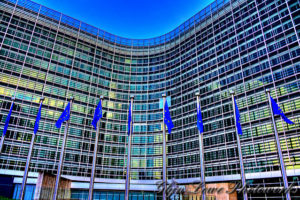Corporate Accountability News Highlights is a regular series by Ranking Digital Rights highlighting key news related to tech companies, freedom of expression, and privacy issues around the world.
European Commission gives tech companies 1 hour to remove terrorist content
Online platforms should remove terrorist content within one hour after being notified, the European commission said in a new recommendation. On 1 March the Commission adopted a “Recommendation on measures to effectively tackle illegal content online” proposing a “common approach” for platforms to “detect, remove and prevent the re-appearance of content online” including terrorist content, hate speech, child sexual abuse material, and copyright infringement.
“Given that terrorist content is typically most harmful in the first hour of its appearance online and given the specific expertise and responsibilities of competent authorities and Europol, referrals should be assessed and, where appropriate, acted upon within one hour, as a general rule,” the commission explained in the Recommendation.
Companies should also put in place “easy and transparent rules” to flag illegal content including “fast-track procedures for ‘trusted flaggers’,” the Commission said. It also advises companies to cooperate “through the sharing and optimisation” of technological tools that automatically detect terrorist content.
While not legally binding, the recommendation increases pressure on tech giants, already facing scrutiny in the EU, to act with speed to remove illegal content.
The latest move by the EU to regulate online platforms was met with criticism by the Computer & Communications Industry Association, which represents the tech industry. In a statement, the association said the one hour limit “will strongly incentivise hosting services providers to simply take down all reported content.”
The Center for Democracy and Technology, which advocates for online civil liberties and rights, said the new rules “lack adequate accountability mechanisms,” adding that its “emphasis on speed and use of automation ignores limits of technology and techniques.”
Companies should be transparent about their process for enforcing their rules by disclosing information about the types of content or activities they do not allow, and the processes they use to identify infringing content or accounts. None of the internet and mobile ecosystem companies evaluated in the 2017 Corporate Accountability Index disclosed whether government authorities receive priority consideration when flagging content to be restricted. Companies should also disclose and regularly publish data about the volume and nature of actions taken to restrict content or accounts that violate their rules. Of the 22 internet, mobile, and telecommunications companies evaluated in the 2017 Corporate Accountability Index, only three—Microsoft, Twitter, and Google—published any information at all on their terms of service enforcement.
Washington state passes net neutrality law
The state of Washington has become the first U.S. state to enact its own net neutrality law, in response to a decision repealing net neutrality protections by the Federal Communications Committee (FCC).
On March 6, Washington state governor Governor Jay Inslee signed the law banning Internet Service Providers (ISPs) from from blocking, throttling, or offering paid prioritization for certain types of content. The law, however, does not ban providers from imposing data limits and allowing zero rating offers. Zero rating allows users to access certain services for free without counting such access against their data caps, a practice often criticized by digital rights groups for undermining net neutrality.
At least 25 other states including New York, California, and Nebraska are considering adopting rules protecting net neutrality at the state level.
A free and open internet depends on the ability for all users to have equal access to content and services, which is not possible if ISPs block or delay certain types of content or apps. Telecommunications companies should commit to not prioritize or block certain types of network traffic. As 2017 Corporate Accountability Index research shows, most of the world’s leading telecommunications companies fall short of making such a public commitment. Of the ten telecommunications companies evaluated in the 2017 Index, Vodafone was the only one to clearly disclose that it does not prioritize, block, or delay certain types of traffic, applications, protocols, or content for reasons beyond assuring quality of service and reliability of the network.
Internet access restored to Cameroon’s Anglophone regions
Internet access has been restored to Cameroon’s Northwest and Southwest Anglophone regions as of 1 March, Access Now reported.
The Cameroonian government resorted to shutting and slowing down networks in response to protests against the marginalization of the English-speaking community. Quartz reports that for over a year, the internet in the two Anglophone regions has either been completely off or slowed down for more than 240 days.
Although restored, users on the ground are complaining of unstable and slow networks. While social media sites are accessible, a number of websites remain blocked and can only be accessed through VPNs.
Shutting down networks and restricting access to online communications violate human rights. A resolution adopted by the UN Human Rights Council in June 2016 condemns “measures to intentionally prevent or disrupt access to or dissemination of information online in violation of international human rights law.” While governments should refrain from ordering telecommunications companies to restrict services, companies should be transparent about the circumstances under which they may comply with such orders. They should disclose information about how they handle government network shutdown demands, including under whose authority a shutdown is ordered, so that those responsible can be held accountable. None of the telecommunications companies evaluated in the 2017 Corporate Accountability Index disclosed sufficient information about how they handle government network shutdown demands.




